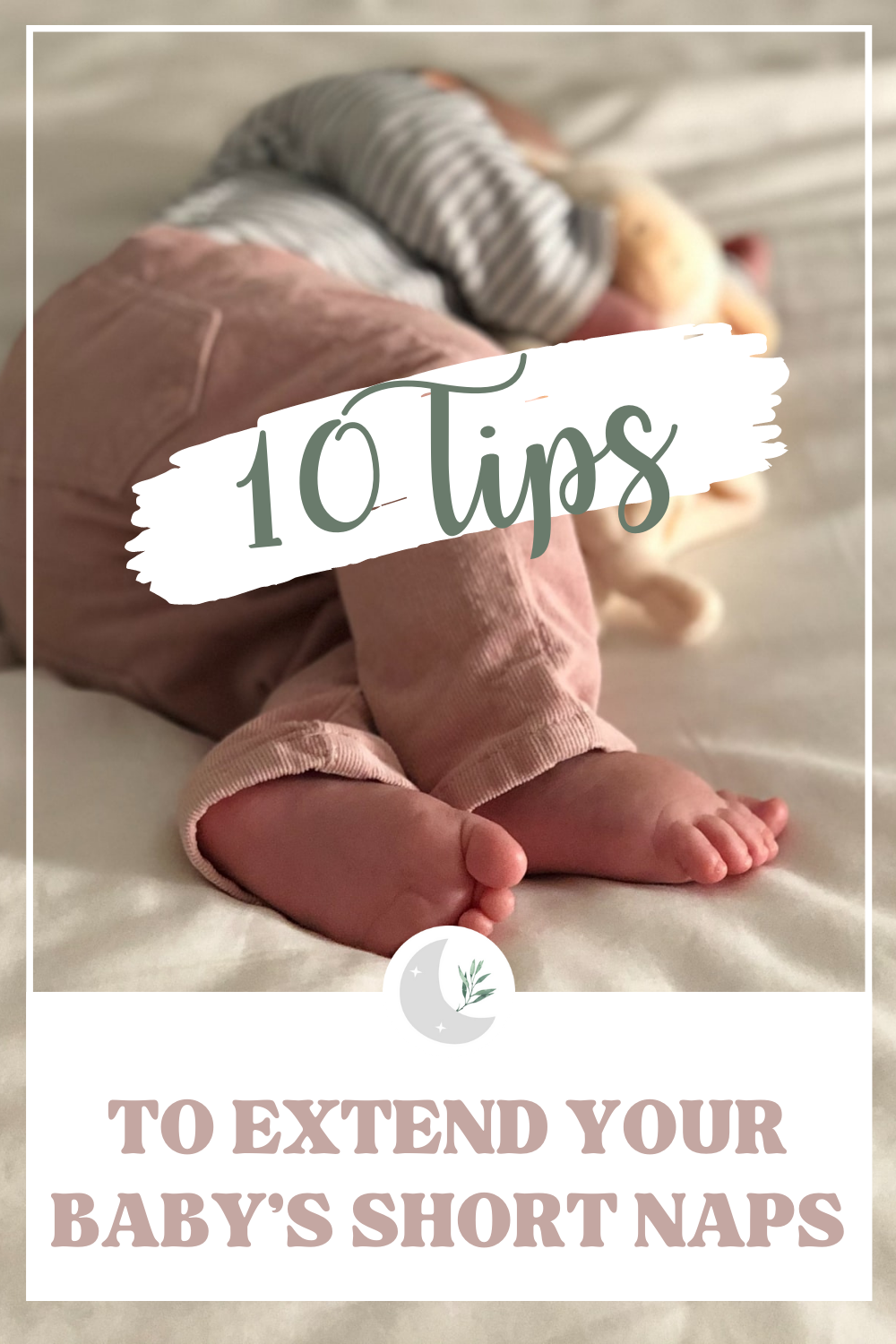The real reasons why your little one is only napping for a short time and what you can do about it
If you could take a nap it would probably be 12473892 hours long, right? Unlike a catnapping baby. Nope, they would rather sleep for joyful 20 minutes. My second born considered even 10 minutes a nap.
Short naps are probably one of those unpleasant surprises new parents are facing. Your baby just drifted off to sleep and you finally got some time for yourself. But just as you sit down after quickly doing vital human tasks such as eating or going to the bathroom, they are up again. So let's see what is going on here.
SHORT NAPS ARE A THING
What you are experiencing is the dreaded cat nap! Cat naps, crap naps, whatever you may call them, usually last from 15-40 minutes and are very common, especially in young babies. What happens is that your baby is waking after the first sleep cycle and does not fall back to sleep. Moreover, their sleep is all over the place as they still have day/night confusion going on and cannot differentiate between day and night.
Cat naps are also not necessarily a bad thing. In fact, they serve a great purpose of protecting your baby. This behavior is programmed into young infants as a survival mechanism. From an evolutionary point of view, they are unsafe during sleep.
Furthermore, there is no evidence that suggests that short naps are not as good as long naps for babies. They may not be ideal for us but may be enough for your baby to recharge and regulate their stress levels. It really depends on your baby. If your baby is waking happy and content and is in a good mood afterward, they probably had enough sleep (even though they might need to nap again shortly after). However, if your little one is already waking up grumpy or crying and continues with a bad mood until the next nap, chances are their nap was not restorative enough.
CAT NAPS CAN BE FRUSTRATING
Usually, cat naps resolve themselves at around 8-9 months. Your baby will naturally be ready for more uninterrupted consolidated naps. But let's be honest. 9 months can be a long time, unlike half-hour naps which more feel like 10 minutes. And if you are already struggling with getting your little one to sleep, then short naps almost feel like a fight to no purpose.
While for young infants this is completely normal biological behavior deriving from biological nature, older babies are capable of longer naps when you try to follow some helpful tips.
WHAT YOU CAN DO ABOUT SHORT NAPS
1. Keep an eye on age-appropriate wake windows
If your baby is up for longer they can handle, their body will release stress hormones causing them to wake shortly after they have fallen asleep. On the other hand, if your baby is not tired enough, a short nap will be sufficient enough for the next round of play. That is why age-appropriate wake windows are key. If your little one shows tired signs before you put them to bed but then fights you, they are probably overtired. If they were in a good mood but falling asleep takes a very long time, they are probably undertired.
2. Rule out hunger
Very young babies need frequent feeds and nap for 2 hours is a long time without any milk. "Eat play sleep" is a very widely known routine for babies. However, when your baby is not on solids yet, having another milk feed might help to extend that nap.
3. Create the optimal sleep environment
When your baby wakes from their sleep cycle you want a comfortable and sleep-inducing environment that helps them fall back to sleep easily. They spend a lot of time in light sleep and any discomfort can lead them to fully wake up and they will hardly be able to fall back to sleep. Daylight plays a very big role. After 4 months babies get very interested in their surroundings sometimes preventing them to settle. So, you might prefer putting your baby down for a nap in a dark environment.
4. Keep a flexible sleep schedule
A schedule will help babies from up to 2 months create a consistent sleep routine that adjusts their inner body clock to regular nap times. Your schedule should be flexible as your baby will not wake up exactly the same time every day and activities vary from day to day. It will also help you better keep track of your baby's awake time because the right wake windows will promote better napping as well. But following a rough nap schedule will not only help them sleep longer, but they also will settle easier to sleep in the evening.
5. Extend those naps by resettling back to sleep
A sleep schedule will help your baby get in the mood for sleep at roughly the same times of the day. Helping your baby fall back to sleep will help their body adjust to sleeping longer, until a new wake up time. This will take some time though (approx. 2-3 weeks). Settle your baby back to sleep any way you want. The goal is to get them back to sleep for that longer stretch. Ideally, tackle the lunch nap first. Your baby will usually start with 3-4 naps a day. But until the age of 12-14 months most babies drop all naps besides the lunch nap. The morning nap and afternoon nap will get shorter naturally and is not really worth fighting. So it makes more sense to get the most of the lunch nap since it's the nap your little one will keep until the age of 3. When you try to lengthen that one specific nap you are setting your baby's circadian rythmn to sleep longer at that hour of the day.
6. Help them get used to their sleeping environment
This especially applies to older babies (9+ months). If your little one is not comfortable falling asleep in their sleep space, they will have trouble staying asleep during naps. Try to encourage falling asleep in bed. This is not an easy task to do and may take a couple of weeks. But once your baby has the hang out of falling asleep at the beginning of naptime in their bed (parental presence is always ok!), they will sleep for a longer stretch as well. For children older than 1 you can also introduce safe loveys or toys that they can keep in their bed. They can help them settle back to sleep.
7. Don’t rush in
If your baby wakes from their nap try to wait for up to 10 minutes (unless they are crying) to see if they are falling back to sleep. Sometimes they will let out a short cry and then go back to sleep on their own. Often babies are capable of more than we expect.
8. Short nap routine
Just like a bedtime routine will help your little one wind down for the night, a short nap routine helps transition from play to sleep time. It signals your baby that nap time is approaching and switch into sleep mode. Your routine can be short: feed, brush teeth, book. Try a routine similar to your bedtime routine.
9. Embrace contact naps
Oh no, I did it. I'm telling you something that conventional sleep trainers probably would not do. Take advantage of contact naps. Many young babies sleep perfectly when they are close to their parent. It's a normal thing that derives from natural and evolutionary human behavior. Your baby simply feels completely safe when with you. I know, it may feel sometimes like a trap, but try to embrace and enjoy it. Sit down somewhere safe and feel that warm baby on your breast (and oh my god, smell them). If you feel too restricted. You can also use a carrier or a sling with which you will still have your arms free.
10. Create new passive sleep associations
Sometimes older babies rely heavily on parental help to fall asleep, such as feeding or rocking to sleep. While these sleep associations are not bad, they might reinforce their catnapping behavior. Try to introduce passive sleep associations such as white noise and a sleeping bag. You can also try to use soothing methods such as shushing, patting, and stroking. These are usually not that strong sleep associations like rocking or feeding.
GETTING NAPS IN ORDER TAKES TIME
If your baby is a catnapper or their naps are all over the place, then nap "training" will take some time and effort. You may need a couple of weeks until those naps are in check. Don't obsess about your baby's napping behavior too much. It will only increase your anxiety and stress levels on which your baby will most certainly pick up. Tackle it with patience and one nap at a time. Also, if your baby seems totally happy with cat naps and you don't mind as well, then there is nothing wrong with embracing those short naps. In the end, your baby will always get the sleep they need.









